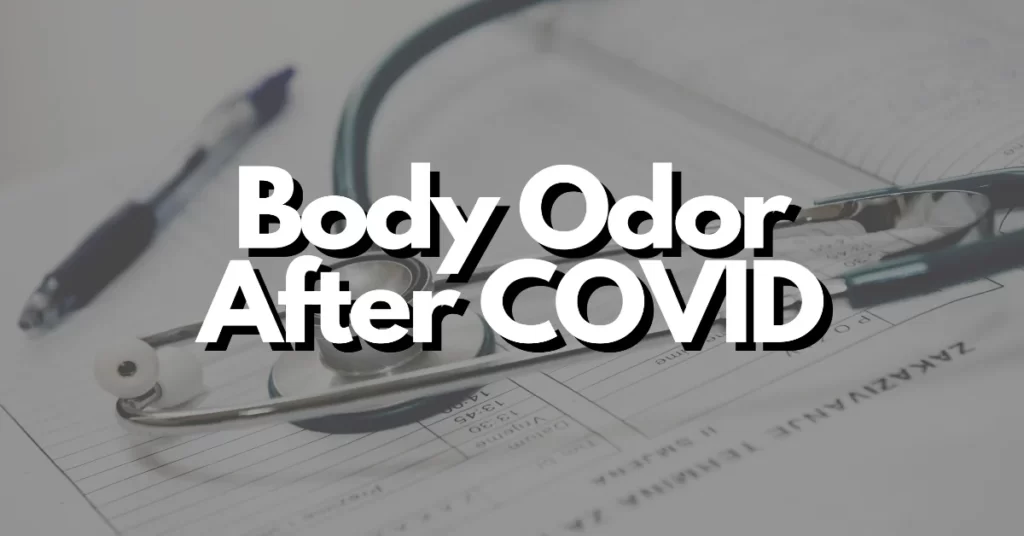COVID-19, caused by the SARS-CoV-2 virus, has been a global pandemic with wide-ranging effects on health and well-being. One lesser-known effect of COVID-19 is changes in body odor that some individuals may experience during or after recovery from the virus.
In this blog post, we will explore the potential connection between body odor and COVID-19, possible reasons for changes in body odor, and tips for managing body odor after COVID-19.
Common Body Odor Changes Reported by COVID Survivors
As COVID-19 is a novel virus, there is still ongoing research and understanding of its long-term effects. However, some COVID survivors have reported changes in body odor during their recovery process. These changes may vary from person to person and can be attributed to various factors.
Understanding the Relationship between COVID-19 and Body Odor
COVID-19 primarily affects the respiratory system, but it can also have systemic effects on other parts of the body. Sweat and body odor changes after COVID-19 could be linked to several factors, including:
- Medications: COVID-19 patients who have been hospitalized may receive medications, such as antibiotics, antiviral drugs, or steroids, which can affect the body’s normal physiological processes, including sweat production and body odor.
- Changes in metabolism: COVID-19 can impact the body’s metabolic processes, and changes in metabolism could potentially affect sweat composition and body odor.
- Immune response: The body’s immune response to COVID-19 may result in changes in sweat production and composition, which could contribute to body odor changes.
- Stress and anxiety: Recovering from COVID-19 can be physically and emotionally stressful, and stress and anxiety can affect the body’s hormonal balance and sweat production, potentially leading to body odor changes.
Post-COVID Recovery: Effects on Sweat and Body Odor
Some COVID survivors have reported changes in their sweat and body odor during the recovery process. These changes may include:
- Increased or decreased sweat production: Some individuals may experience increased or decreased sweat production after recovering from COVID-19, which can impact body odor.
- Changes in sweat composition: Sweat is composed of water, salt, and other compounds. Changes in sweat composition, such as increased levels of certain chemicals or imbalanced electrolytes, could potentially contribute to body odor changes.
Coping with Post-COVID Body Odor: Self-care Strategies
If you are experiencing changes in body odor during your recovery from COVID-19, here are some self-care strategies that may help:
- Maintain good hygiene: Regularly shower or bathe using mild soap and water to cleanse the skin and reduce bacteria that can contribute to body odor.
- Use antiperspirants or deodorants: Antiperspirants can help to reduce sweating, while deodorants can mask or neutralize body odor. Choose products that are safe and appropriate for your skin type.
- Wear breathable clothing: Choose clothing made of breathable fabrics, such as cotton, and avoid tight-fitting clothes that can trap sweat and bacteria, leading to body odor.
- Stay hydrated: Drink plenty of water to stay hydrated, which can help to maintain normal sweat production and composition.
- Practice stress management techniques: Engage in stress-reducing activities, such as exercise, meditation, or deep breathing, to help manage stress and anxiety, which may contribute to body odor changes.
- Pay attention to diet: Some foods, such as spicy or strongly flavored foods, may contribute to body odor. Pay attention to your diet and avoid foods that seem to worsen body odor.
Consulting a Healthcare Professional for Persistent Body Odor after COVID
If you are experiencing persistent body odor changes after recovering from COVID-19, it’s important to consult with a healthcare professional for proper evaluation and management.
They can assess your individual case, consider any underlying medical conditions or medications that may be contributing to the body odor changes, and provide appropriate recommendations or treatments.
It’s important to note that while some COVID survivors may experience changes in body odor during their recovery, these changes are generally temporary and resolve on their own over time.
However, if you have concerns or if the body odor changes persist, it’s best to seek medical advice for proper evaluation and management. Your healthcare professional can help determine the underlying cause of the body odor changes and provide appropriate guidance and treatment options.
Conclusion
In conclusion, body odor changes after COVID-19 may be a surprising and unexpected experience for some individuals.
However, it’s important to remember that COVID-19 is a complex virus that can impact the body in various ways, including changes in body odor. If you notice changes in your body odor after recovering from COVID-19, it’s important to practice good hygiene, use appropriate deodorant, and consult with a healthcare professional if the changes persist or are accompanied by other symptoms
As our understanding of COVID-19 continues to evolve, it’s crucial to stay informed and take necessary steps to manage any changes in body odor that may occur.

